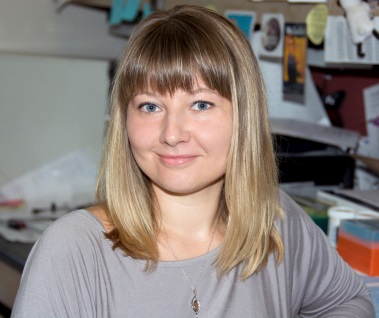
Trainee Spotlight: Tatiana Prudnikova, PhD
-
Tatiana Prudnikova, PhD

Postdoctoral Associate
Dr. Jon Chernoff’s Lab
Fox Chase Cancer Center
[email protected]Biography
Only a few very lucky people are born knowing exactly what they want to be when they grow up. As a little girl, I dreamt of becoming a veterinarian. During my early quests to save cute kittens and puppies, I came face to face with the beauty of biology and chemistry and became entranced with the intricate pathways that make the cell live, form tissues and create a functional organism. After receiving my Master Degree in Biology from Novosibirsk State University, I joined Dr. Elvira Grigoreva group at the Institute for Molecular Biology and Biophysics, where I became interested in cancer research. During my PhD in Dr. Grigoreva’s lab, I collaborated with a very competitive lab at the Karolinkska Institute in Sweden. Living and working in the “Nobel Prize city”, surrounded by both high level science and a deep understanding of the importance of research, inspired me to continue research after my PhD. I joined Dr. Chernoff’s lab at Fox Chase to work on deciphering the mechanisms underlining the progression and drug resistance of ovarian cancer. I find myself extremely lucky to have found not only a stimulating academic environment, but also a supportive, fun and friendly entourage. My immediate career goals are to better my scientific training while increasing my contribution to cancer research.
Research Overview
Our previous studies identified p21 activated kinase (Pak1) as a critical driver of many cancers, including ovarian carcinomas. My work focuses on the mechanisms used by Pak1 signaling in ovarian carcinoma and has identified Pak1 as an attractive target for chemotherapeutic drugs. In this work, we found that inhibition of Pak1 leads to decreased proliferation and migration in PAK1 amplified/overexpressed ovarian cancer cells, but has no effect in cells that lack amplification/overexpression. Further, we observed that loss of Pak1 function causes 11q13 amplified ovarian cancer cells to arrest in the G2/M phase of the cell cycle. This arrest correlates with activation of p53 and p21Cip and decreased expression of cyclin B1. These findings suggest that small molecule inhibitors of Pak1 may play a therapeutic role in the ~25% of ovarian cancers characterized by PAK1 gene amplification. Currently, I am expanding my findings to other Pak1 dependent cancers, such as breast cancer.
Featured Publication
Prudnikova TY, Villamar-Cruz O, Rawat SJ, Cai KQ, Chernoff J. Effects of p21-activated kinase 1 inhibition on 11q13-amplified ovarian cancer cells. Oncogene. 2015 Aug 10. doi: 10.1038/onc.2015.278. [Epub ahead of print]
